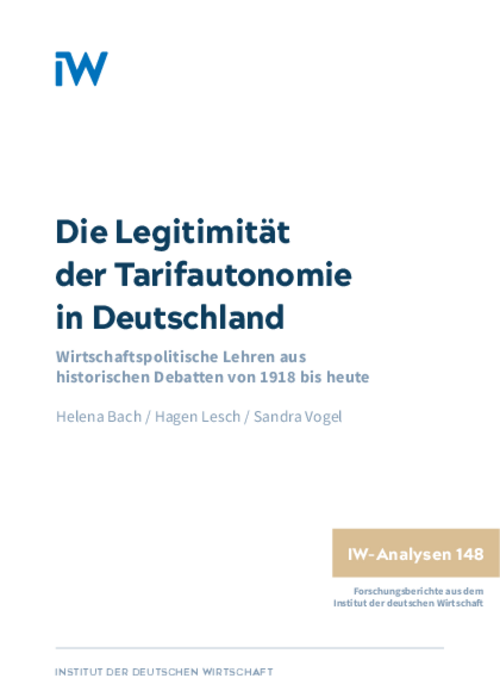Since the signing of the Stinnes-Legien Agreement in 1918, the collective bargaining autonomy of Germany’s employers’ associations and trade unions has been the subject of continual political debate and at times its legitimacy even called into question.

The Legitimacy of Free Collective Bargaining in Germany: Economic policy lessons from historical debates from 1918 to the present

Since the signing of the Stinnes-Legien Agreement in 1918, the collective bargaining autonomy of Germany’s employers’ associations and trade unions has been the subject of continual political debate and at times its legitimacy even called into question.
An ongoing review of the freedom allowed to the two sides of industry to negotiate on their own terms and the extent to which it serves its purpose can thus be seen as inherent in the system. The debate over the years has focused on whether collective bargaining autonomy creates a just balance between the interests of employees and employers, serves the common good and is compatible with the macroeconomic objectives of the national government. The criteria for the review have varied according to the general economic situation and the political orientation of the government of the time. The present analysis of two fundamental and nine historical debates shows that state influence on collective bargaining autonomy is not without risk. It is true that adjustments to the framework conditions that ensure the functioning of free collective bargaining and regulate the cooperation between the two sides have proven helpful. Yet when the state intrudes too deeply in the competences of the bargaining parties, it fails to meet its aims. This observation needs to be given due weight in the current political debate on strengthening collective bargaining. If the government decides to enhance the effectiveness of the bargaining process, it should be done “from below”, by making membership of employers’ associations more attractive and thus safeguarding free collective bargaining as the collectively-exercised autonomy of private parties

The Legitimacy of Free Collective Bargaining in Germany: Economic policy lessons from historical debates from 1918 to the present

More on the topic

German Wage Policy between Inflation and Stagnation: Are Conflicts with the Aims of Monetary Policy Looming?
After the economic and financial crisis of 2008/9, the German labour market soon began to recover, creating scope for a comparatively expansive wage policy.
IW
The Pros and Cons of Trade Union Membership
The decline in collective bargaining coverage in Germany is often attributed to the reluctance of companies to join an employers' association which negotiates collective agreements.
IW